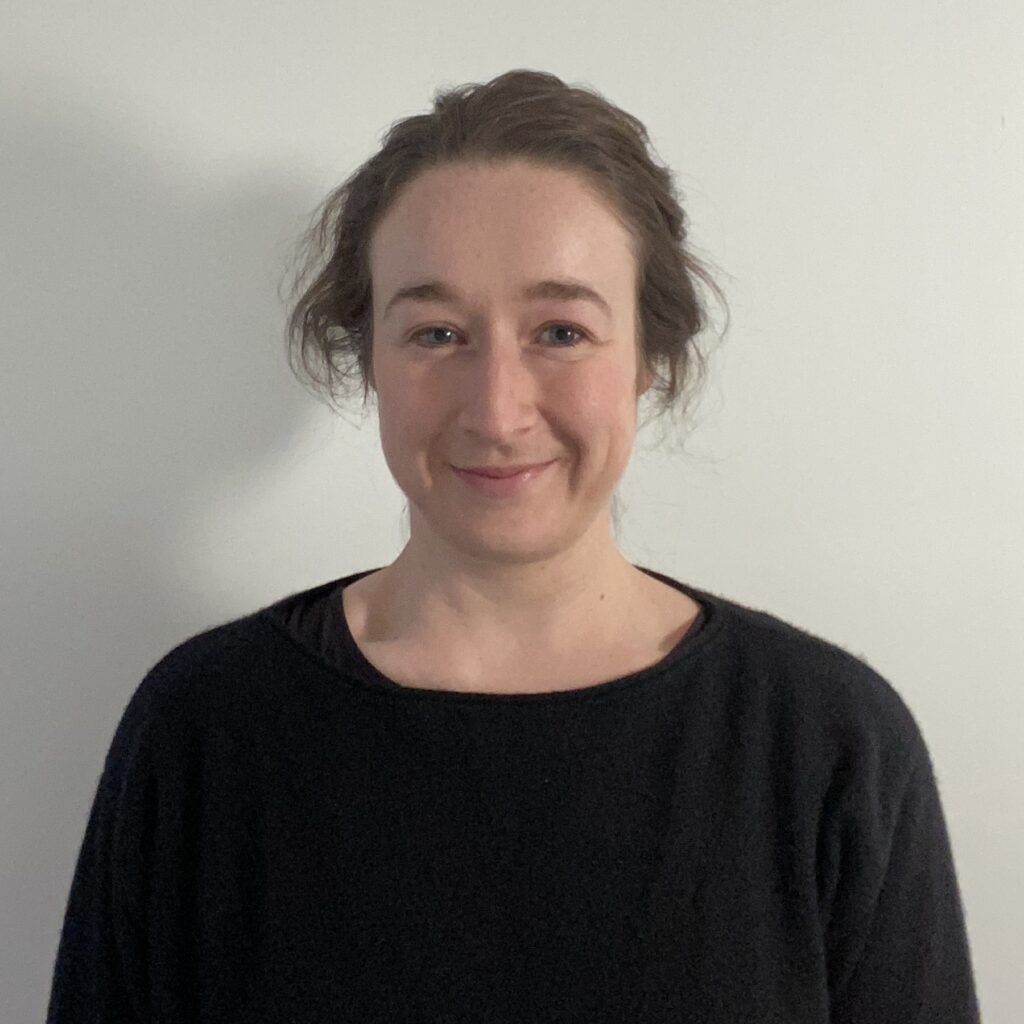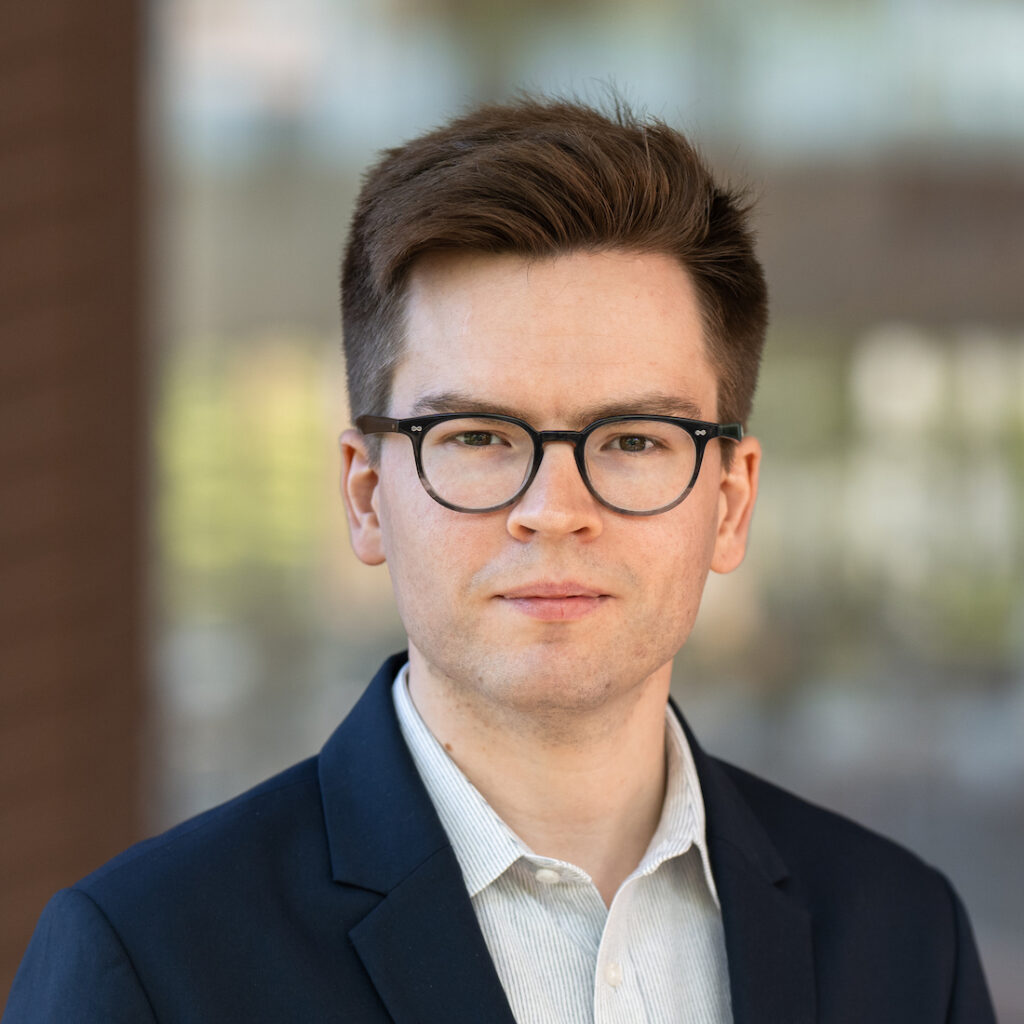Recognizing young research talent, the 2023 NOMIS & Science Young Explorer Award was presented to grand prize winner Michael Skinnider and finalists Isabella Bower and George Goshua at a ceremony on Wednesday, June 5, 2024, at the University of Zurich, Switzerland.
Science Deputy Editor Stella Hurtley; Bill Moran, publisher of the Science family of journals; and NOMIS Foundation Managing Director Markus Reinhard presented the NOMIS & Science Young Explorer Award to Michael Skinnider, Isabella Bower and George Goshua on June 5 at the University of Zurich. Skinnider, Bower and Goshua each presented their innovative research to an audience that included NOMIS researchers with backgrounds in the social and life sciences as well as the humanities, and representatives from ETH Zurich and the University of Zurich, both NOMIS partner institutions.
The NOMIS & Science Award recognizes bold early-career researchers who ask fundamental questions at the intersection of the social and life sciences. The award is presented for outstanding research performed by the applicant as described in an essay. Award winners receive a cash prize, and their essay submissions are published in Science.
“The NOMIS & Science Award honors the achievements of three visionary early-career researchers who have fearlessly embarked on a journey to tackle some of the most exciting and relevant questions at the intersection of the life and social sciences,” said Reinhard. “Their research not only pushes the boundaries of knowledge but also sparks our imagination about what is possible.”
Grand prize winner Michael Skinnider
Michael Skinnider, assistant professor in the Princeton Branch of the Ludwig Institute for Cancer Research and the Lewis-Sigler Institute for Integrative Genomics at Princeton University (US), won the NOMIS & Science Award for developing an artificial intelligence–based approach to identify new designer drugs wreaking havoc in an ever-greater number of global communities.

In the past 20 years, a wave of new designer drugs — most of which have never been tested in humans — has reshaped the illicit drug market. Many of these are created by making slight chemical modifications to conventional drugs of abuse like cocaine.
“There are dozens to hundreds of these drugs emerging every year,” said Skinnider. These new substances cause alarming symptoms – leading people to stagger through the street moaning and staring blankly, for example. And in some cases, they are fatal.
Skinnider’s research explores how AI, specifically generative language models trained on chemical structures, can accelerate the identification of such emerging drugs from mass spectrometry data. By successfully training these models on limited data, he demonstrated the potential to predict and identify new designer drugs, aiming to enhance emergency and public health responses to drug outbreaks.
His new technology has already been applied to tens of thousands of patient drug samples and used to discover several new designer drugs. The results suggest that large language models could dramatically accelerate the pace of classifying these emerging substances.
His award-winning essay, “Hallucinating hallucinogens,” describes Skinnider’s AI-based approach to this serious public health problem.
Finalist Isabella Bower

Isabella Bower, a postdoctoral research fellow at the University of South Australia, is a finalist for the NOMIS & Science Award for her work to reveal how building design shapes our behavioral, brain, and body responses.
Tracing its roots back to her own childhood patterns of behavior and problem-solving, Bower’s research uses a combination of psychology, neurobiology, physiology, engineering and architecture to understand how the design of built environments impacts cognitive processes. Her research aims to establish an evidence base for designing environments that support psychological health and performance, ultimately seeking to create inclusive spaces that optimize cognitive function and wellbeing for diverse tasks and needs.
Bower’s award-winning essay is “How do our environments affect our minds?”
Finalist George Goshua
George Goshua, assistant professor of medicine (hematology) at the Yale University School of Medicine (New Haven, US), is a finalist for his work to uncover how mathematical models hold the key to equitable patient care.

Despite its potential to prevent more expensive hospital readmissions, Goshua’s request to treat a patient with rituximab — an off-label treatment for immune thrombotic thrombocytopenic purpura (TTP) — was denied. Goshua subsequently published a cost–benefit analysis that influenced the approval of rituximab for TTP, highlighting the importance of simple quantitative methods in clinical decision-making.
Now, leading a lab that intersects clinical hematology-oncology and health economics, Goshua’s efforts focus on improving the use of financial resources in healthcare, addressing rare diseases, and ensuring health equity using data-driven approaches starting from basic “napkin math.”
Goshua’s award-winning essay describing his research is “Napkin math can change the world.”
NOMIS & Science Young Explorer Award
Through the NOMIS & Science Young Explorer Award, the editors of Science and NOMIS are recognizing bold young researchers with an MD, PhD or MD/PhD who ask fundamental questions at the intersection of the social and life sciences. It is awarded to scientists who conduct research with an enthusiasm that catalyzes cross-disciplinary collaboration and who take risks to creatively address relevant and exciting questions.
About Science/AAAS
The American Association for the Advancement of Science (AAAS) is the world’s largest general scientific society, and publisher of the journals Science, Science Translational Medicine, Science Signaling, Science Advances, Science Immunology, and Science Robotics. AAAS was founded in 1848 and includes some 254 affiliated societies and academies of science, serving 10 million individuals. Science, founded by Thomas Edison, has the largest paid circulation of any peer-reviewed general science journal in the world, with an estimated total readership of more than 400,000.
The nonprofit AAAS — www.aaas.org — is open to all and fulfills its mission to “advance science and serve society” through initiatives in science policy, international programs, science education, and more. Science‘s daily online news is always free to the public, as are editorials, any paper with broad public health significance, and all research articles 12 months after publication. Science further participates in various efforts to provide free access for scientists in the world’s poorest countries.
Related news
2023 NOMIS & Science Young Explorer Award winners announced
Feature image: 2023 NOMIS and Science Young Explorer Award winner Michael Skinnider (right) and finalists George Goshua (left) and Isabella Bower (center) at the NOMIS & Science Young Explorer Award ceremony on June 5, 2024, in Zurich.





